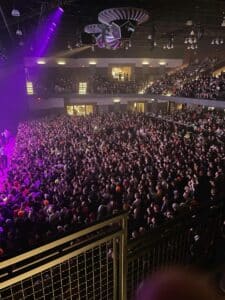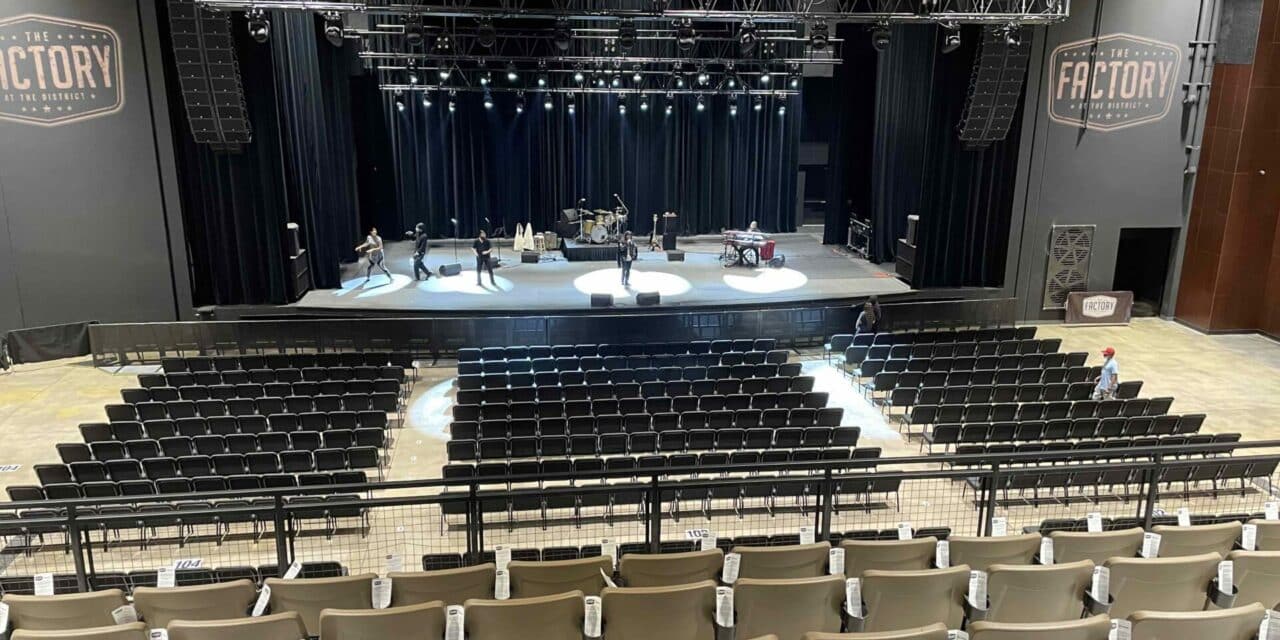CUSTOM CONFIGURATIONS: A convertible wall system allows The Factory in St. Louis to expand from 900 reserved seats to 3,500 capacity for general admission shows. (Courtesy venue)
Venue Anchors Entertainment Hub
Size matters at The Factory in St. Louis, Missouri.
The $23 million live entertainment facility was designed with a convertible wall system to offer custom, scalable options from 900 reserved seats to a 3,500 general admission floor.
St. Louis native Dan Merker has been the talent buyer at The Factory since it opened in July 2021 as a cornerstone of The District, a budding entertainment and sports hub in what was a former strip mall 20 minutes west of downtown St. Louis . The district is under development by The Staenberg Group, which is tied to 200 shopping centers and 2,000 restaurants.
“We took the pros and cons of every building we’ve been to and constructed this from the ground up with that in mind,” said Merker. “In a market like St. Louis, you aren’t going to have the lights on every night with a capacity of 3,500, so we thought, ‘How can we design this like a PAC with fully reserved seats but also open the floor and a reserved balcony?’”
Over the past year, The Factory has played a vital role in attracting live music by offering a flexible configuration with equally nimble sound centered anchored by a L-Acoustics’ K2 sound system.
The Factory is a viable option for a variety of performers with the opportunity build an audience in a market with 2.8 million residents and grow the available space.
The venue opened last year with EDM artist Deadmau5, followed with a diverse list of concerts, comedy shows and mixed martial arts events. It’s hosted shows with Olivia Rodrigo, jazz/hip-hop group The Roots, blues guitarist Buddy Guy and alt-pop outfit Glass Animals. Later this year, multi-platinum selling pop-punk band Paramore (Oct. 11) plays The Factory.
Adjusting the space based on ticket sales has its advantages. The convertible wall system features fully welded panel frames that use heavy steel with soundproof acoustic skins and rubber bumpers on the bottom. Venue officials say it takes about 15 minutes to set up by a crew of four to six people. The system is employed a few times each month.
Having multiple configurations means The Factory can add space when sales exceed expectations. Merker said in the past year they have not reduced capacity.
“I’m enjoying it,” said Merker whose career included stints with Outback Presents, HUKA Entertainment, Tortuga Music Festival and Hangout Music Festival.
“It’s fun in the world of a talent buyer now,” he said. “You could go back 15 years ago and a lot of things were predicted, based off radio and there really wasn’t a lot of ticket data on how an artist had done in the past. Now, you’ve got more measurable data, socials, Spotify and box office history that buyers can track down. You have a better grasp on what an artist will do in the market.”
Merker books most shows in-house, but also works with AEG, SaveLive, Disco Donnie Productions and Live Nation. “To me it’s really more about putting the right artist in the right venue, where they belong,” he said.

“Got to see (The Factory) with my own eyes during the Randy Houser headline tour this past spring,” said Greg Oswald, co-head of WME Nashville. “New, modern, thoughtful, airy, easy load-in and sounded great. The staff was on top of it all. Artist and fan-friendly in every way. The crowd rocked out, and they were comfortable. Good market, good building and good operators.”
Bookings across several genres including country, rock and contemporary are happening further out with dates booked into fall 2023.
“That would have never happened before COVID,” Merker said. “Agents are taking more time to plan further ahead. Some of it has do with the difficulties in getting bus drivers, trucks, tour buses and a shortage with production gear. (The pandemic) just sent us this big can of unknown, new variables. Slowly, we are figuring out along the way and adapting.”
The upside of opening in 2021 was the impact on staffing. “It was definitely a blessing,” Merker said. “When we hired staff for all positions at the venue, there were a lot of people out of work with a lot of experience in the industry. For the most part, we have overqualified staff.”
Free parking and mobile technology with the Rooam application to order refreshments from their seats is making the venue popular with fans.
“That’s been one thing that has really been nice with the scalability of the venue,” Merker said. “We can book genres for everyone in St. Louis whether it’s classic rock, EDM, R&B, kids shows and metal; we can literally do something for everyone.”







